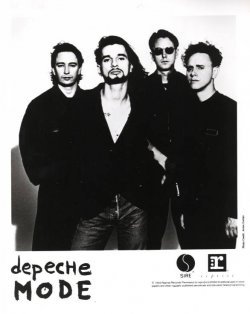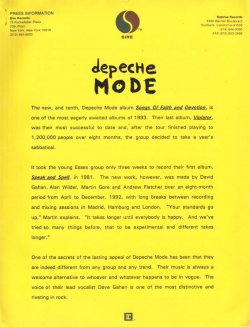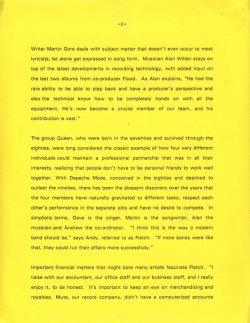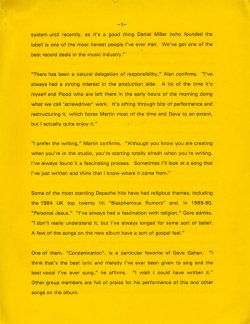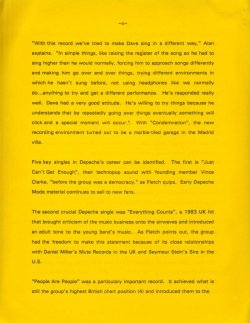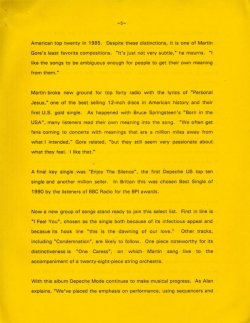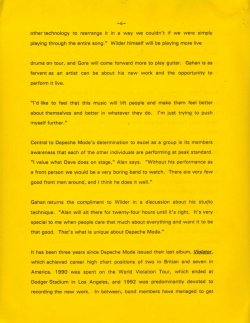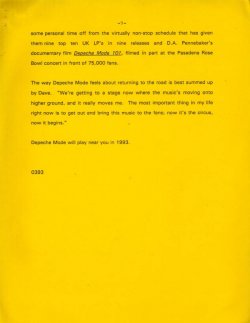You are using an out of date browser. It may not display this or other websites correctly.
You should upgrade or use an alternative browser.
You should upgrade or use an alternative browser.
Depeche Mode Songs Of Faith And Devotion Press Release
- Thread starter demoderus
- Start date
Lively promotional blurb for Songs Of Faith And Devotion, which manages to strike a sensible balance between covering the different aspects of the band. Instead of the usual history the author has picked out five key songs, and captures as far as possible the feel of the band's music by focusing on the role and views of each band member. Less hyped and better to read than many promotional items.
" With Depeche Mode, conceived in the eighties and destined to outlast the nineties, there has been the pleasant discovery over the years that the four members have naturally gravitated to different tasks, respect each other’s performance in the separate jobs and have no desire to compete. "
The new, and tenth, Depeche Mode album Songs Of Faith And Devotion, is one of the most eagerly awaited albums of 1993. Their last album, Violator, was their most successful to date and, after the tour finished playing to 1,200,000 people over eight months, the group decided to take a year’s sabbatical.
It took the young Essex group only three weeks to record their first album, Speak and Spell, in 1981. The new work, however, was made by David Gahan, Alan Wilder, Martin Gore and Andrew Fletcher over an eight-month period from April to December, 1992, with long breaks between recording and mixing sessions in Madrid, Hamburg and London. “Your standards go up,” Martin explains. “It takes longer until everybody is happy. And we’ve tried so many things before, that to be experimental and different takes longer.”
One of the secrets of the lasting appeal of Depeche Mode has been that they are indeed different from any group and any trend. Their music is always a welcome alternative to whoever and whatever happens to be in vogue. The voice of their lead vocalist Dave Gahan is one of the most distinctive and riveting in rock.
Writer Martin Gore deals with subject matter that doesn’t even occur to most lyricists, let alone get expressed in song form. Musician Alan Wilder stays on top of the latest developments in recording technology, with added input on the last two albums from co-producer Flood. As Alan explains, “He had the rare ability to be able to step back and have a producer’s perspective and also the technical know how to be completely hands on with all the equipment. He’s now become a crucial member of our team, and his contribution is vast.”
The group Queen, who were born in the seventies and survived through the eighties, were long considered the classic example of how four very different individuals could maintain a professional partnership that was in all their interests, realizing that people don’t have to be personal friends to work well together. With Depeche Mode, conceived in the eighties and destined to outlast the nineties, there has been the pleasant discovery over the years that the four members have naturally gravitated to different tasks, respect each other’s performance in the separate jobs and have no desire to compete. In simplistic terms, Dave is the singer, Martin is the songwriter, Alan the musician and Andrew the co-ordinator. “I think this is the way a modern band should be,” says Andy, referred to as Fletch. “If more bands were like that, they could run their affairs more successfully.”
Important financial matters that might bore many artists fascinate Fletch. “I liaise with our accountant, our office staff and our business staff, and I really enjoy it, to be honest. It’s important to keep an eye on merchandising and royalties. Mute, our record company, didn’t have a computerized accounts system until recently, so it’s a good thing Daniel Miller (who founded the label) is one of the most honest people I’ve ever met. We’ve got one of the best record deals in the music industry.”
“There has been a natural delegation of responsibility,” Alan confirms. “I’ve always had a strong interest in the production side. A lot of the time it’s myself and Flood who are left there in the early hours of the morning doing what we call ‘screwdriver’ work. It’s sifting through bits of performance and restructuring it, which bores Martin most of the time and Dave to an extent, but I actually quite enjoy it.”
“I prefer the writing,” Martin confirms. “Although you know you are creating when you’re in the studio, you’re starting totally afresh when you’re writing. I’ve always found it a fascinating process. Sometimes I’ll look at a song that I’ve just written and think that I know where it came from.”
Some of the most startling Depeche hits have had religious themes, including the 1984 UK top twenty hit “Blasphemous Rumours” and, in 1989-90, “Personal Jesus”. “I’ve always had a fascination with religion,” Gore admits. “I don’t really understand it, but I’ve always longed for some sort of belief. A few of the songs on the new album have a sort of gospel feel.”
One of them, “Condemnation”, is a particular favourite of Dave Gahan. “I think that’s the best lyric and melody I’ve ever been given to sing and the best vocal I’ve ever sung,” he affirms. “I wish I could have written it”. Other group members are full of praise for his performance of this and other songs on the album.
“With this record we’ve tried to make Dave sing in a different way,” Alan explains. “In simple things, like raising the register of the song so he had to sing higher than he would normally, forcing him to approach songs differently and making him go over and over things, trying different environments in which he hasn’t sung before, not using headphones like we normally do… anything to try and get a different performance. He’s responded really well. Dave had a very good attitude. He’s willing to try things because he understands that by repeatedly going over things eventually something will click and a special moment will occur.” With “Condemnation”, the new recording environment turned out to be a marbled-tiled garage in the Madrid villa.
Five key singles in Depeche’s career can be identified. The first is “Just Can’t Get Enough”, their technopop sound with founding member Vince Clarke, “before the group was a democracy,” as Fletch quips. Early Depeche Mode material continues to sell to new fans.
The second crucial Depeche single was “Everything Counts”, a 1983 UK hit that brought criticism of the music business onto the airwaves and introduced an adult tone to the young band’s music. As Fletch points out, the group had the freedom to make this statement because of its close relationships with Daniel Miller’s Mute Records in the UK and Seymour Stein’s Sire in the US.
“People Are People” was a particularly important record. It achieved what is still the group’s highest British chart position (4) and introduced them to the American top twenty in 1985. Despite these distinctions, it is one of Martin Gore’s least favourite compositions. “It’s just not very subtle,” he mourns. “I like the songs to be ambiguous enough for people to get their own meaning from them.”
Martin broke new ground for top forty radio with the lyrics of “Personal Jesus”, one of the best selling 12-inch discs in American history and their first US gold single. As happened with Bruce Springsteen’s “Born In The USA”, many listeners read their own meaning into the song. “We often get fans coming to concerts with meanings that are a million miles away from what I intended,” Gore related, “but they still seem very passionate about what they feel. I like that.”
A final key single was “Enjoy The Silence”, the first Depeche US top ten single and another million seller. In Britain this was chosen Best Single of 1990 by the listeners of BBC Radio for the BPI awards.
Now a new group of songs stand ready to join this select list. First in line is “I Feel You”, chosen as the single both because of its infectious appeal and because its hook line “this is the dawning of our love”. Other tracks, including “Condemnation”, are likely to follow. One piece noteworthy for its distinctiveness is “One Caress”, on which Martin sang live to the accompaniment of a twenty-eight-piece string orchestra.
With this album Depeche Mode continues to make musical progress. As Alan explains, “We’ve placed the emphasis on performance, using sequencers and other technology to rearrange it in a way we couldn’t if we were simply playing through the entire song.” Wilder himself will be playing more live drums on tour, and Gore will come forward more to play guitar. Gahan is as fervent as an artist can be about his new work and the opportunity to perform it live.
“I’d like to feel that this music will lift people and make them feel better about themselves and better in whatever they do. I’m just trying to push myself further.”
Central to Depeche Mode’s determination to excel as a group is its members’ awareness that each of the other individuals are performing at peak standard. “I value what Dave does on stage,” Alan says. “Without his performance as a front person we would be a very boring band to watch. There are very few good front men around, and I think he does it well.”
Gahan returns the compliment to Wilder in a discussion about his studio technique. “Alan will sit there for twenty-four hours until it’s right. It’s very special to men when people care that much about everything and want it to be that good. That’s what is unique about Depeche Mode.”
It has been three years since Depeche Mode issued their last album, Violator, which achieved career high chart positions of two in Britain and seven in America. 1990 was spent on the World Violation Tour, which ended at Dodger’s Stadium in Los Angeles, and 1992 was predominantly devoted to recording the new work. In between, band members have managed to get some personal time off from the virtually non-stop schedule that has given them nine top ten UK LPs in nine releases and D.A. Pennebaker’s documentary film Depeche Mode 101, filmed in part at the Pasadena Rose Bowl concert in front of 75,000 fans.
The way Depeche Mode feels about returning to the road is best summed up by Dave. “We’re getting to a stage now where the music’s moving onto higher ground, and it really moves me. The most important thing in my life right now is to get out and bring this music to the fans; now it’s the circus, now it begins.”
Depeche Mode will play near you in 1993.
One of them, “Condemnation”, is a particular favourite of Dave Gahan. “I think that’s the best lyric and melody I’ve ever been given to sing and the best vocal I’ve ever sung,” he affirms. “I wish I could have written it”. Other group members are full of praise for his performance of this and other songs on the album.
“With this record we’ve tried to make Dave sing in a different way,” Alan explains. “In simple things, like raising the register of the song so he had to sing higher than he would normally, forcing him to approach songs differently and making him go over and over things, trying different environments in which he hasn’t sung before, not using headphones like we normally do… anything to try and get a different performance. He’s responded really well. Dave had a very good attitude. He’s willing to try things because he understands that by repeatedly going over things eventually something will click and a special moment will occur.” With “Condemnation”, the new recording environment turned out to be a marbled-tiled garage in the Madrid villa.
Five key singles in Depeche’s career can be identified. The first is “Just Can’t Get Enough”, their technopop sound with founding member Vince Clarke, “before the group was a democracy,” as Fletch quips. Early Depeche Mode material continues to sell to new fans.
The second crucial Depeche single was “Everything Counts”, a 1983 UK hit that brought criticism of the music business onto the airwaves and introduced an adult tone to the young band’s music. As Fletch points out, the group had the freedom to make this statement because of its close relationships with Daniel Miller’s Mute Records in the UK and Seymour Stein’s Sire in the US.
“People Are People” was a particularly important record. It achieved what is still the group’s highest British chart position (4) and introduced them to the American top twenty in 1985. Despite these distinctions, it is one of Martin Gore’s least favourite compositions. “It’s just not very subtle,” he mourns. “I like the songs to be ambiguous enough for people to get their own meaning from them.”
Martin broke new ground for top forty radio with the lyrics of “Personal Jesus”, one of the best selling 12-inch discs in American history and their first US gold single. As happened with Bruce Springsteen’s “Born In The USA”, many listeners read their own meaning into the song. “We often get fans coming to concerts with meanings that are a million miles away from what I intended,” Gore related, “but they still seem very passionate about what they feel. I like that.”
A final key single was “Enjoy The Silence”, the first Depeche US top ten single and another million seller. In Britain this was chosen Best Single of 1990 by the listeners of BBC Radio for the BPI awards.
Now a new group of songs stand ready to join this select list. First in line is “I Feel You”, chosen as the single both because of its infectious appeal and because its hook line “this is the dawning of our love”. Other tracks, including “Condemnation”, are likely to follow. One piece noteworthy for its distinctiveness is “One Caress”, on which Martin sang live to the accompaniment of a twenty-eight-piece string orchestra.
With this album Depeche Mode continues to make musical progress. As Alan explains, “We’ve placed the emphasis on performance, using sequencers and other technology to rearrange it in a way we couldn’t if we were simply playing through the entire song.” Wilder himself will be playing more live drums on tour, and Gore will come forward more to play guitar. Gahan is as fervent as an artist can be about his new work and the opportunity to perform it live.
“I’d like to feel that this music will lift people and make them feel better about themselves and better in whatever they do. I’m just trying to push myself further.”
Central to Depeche Mode’s determination to excel as a group is its members’ awareness that each of the other individuals are performing at peak standard. “I value what Dave does on stage,” Alan says. “Without his performance as a front person we would be a very boring band to watch. There are very few good front men around, and I think he does it well.”
Gahan returns the compliment to Wilder in a discussion about his studio technique. “Alan will sit there for twenty-four hours until it’s right. It’s very special to men when people care that much about everything and want it to be that good. That’s what is unique about Depeche Mode.”
It has been three years since Depeche Mode issued their last album, Violator, which achieved career high chart positions of two in Britain and seven in America. 1990 was spent on the World Violation Tour, which ended at Dodger’s Stadium in Los Angeles, and 1992 was predominantly devoted to recording the new work. In between, band members have managed to get some personal time off from the virtually non-stop schedule that has given them nine top ten UK LPs in nine releases and D.A. Pennebaker’s documentary film Depeche Mode 101, filmed in part at the Pasadena Rose Bowl concert in front of 75,000 fans.
The way Depeche Mode feels about returning to the road is best summed up by Dave. “We’re getting to a stage now where the music’s moving onto higher ground, and it really moves me. The most important thing in my life right now is to get out and bring this music to the fans; now it’s the circus, now it begins.”
Depeche Mode will play near you in 1993.

